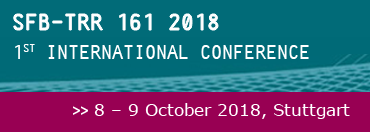The SFB-TRR 161 organizes various events to promote research activities and to inform about current developments in research and education in the field of Visual Computing, both at a national and an international level.
Mar 12th - 13st, 2026
University of Konstanz, Room ZT 1204 (Data Theatre)
Hackathon DR4ET
Organized by:
Patrick Paetzold, Michael Stroh, Ying Zhang
Proposal Submission:
Given the success of past Hackathons, we encourage you to submit a proposal to recruit talented individuals for your project at this year’s event. Please email your PDF to Ying Zhang.
Proposal Deadline: Dec 1st, 2025.
Once we've collected all the proposals and given the authors their feedback, you'll be asked to vote on a topic to get involved.
Location:
University of Konstanz, Room ZT 1204 (Data Theatre)
Apr 23rd, 2026, 9 am - 4 pm
Visualization Research Center, University of Stuttgart
Angebot zum Girls'Day 2026
Creative Coding: Von Musikvisualisierung bis Virtual Reality
Beim Girls'Day am Visualisierungsinstitut der Universität Stuttgart hast du nicht nur die Gelegenheit, faszinierende digitale Umgebungen und farbenfrohe Visualisierungen zu erkunden — sondern auch, sie selbst zu programmieren und nach deinen eigenen Vorstellungen zu gestalten! Tauche mit uns ein in die Welt der Visualisierungsforschung und entdecke, wie kreativ Informatik sein kann.
Mehr zum Anbebot und zur Anmeldung
Jun 16th - 17th, 2026, full days
Internal Status Seminar of the SFB-TRR 161
News and Press
BOGY in der Forschung?
Du möchtest schon während der Schulzeit die Welt der Forschung kennenlernen? Du möchtest dich über die Studiengänge an unseren Transregio Partnern informieren? Du programmierst gerne oder interessierst dich für Informatik und Computergrafik?
Ein BOGY im SFB-TRR 161 gibt dir die Chance, dich mit unseren Forschern auszutauschen und in die Arbeitswelt der Wissenschaft einzutauchen.
FOR SCIENTISTS
Projects
People
Publications
Graduate School
Equal Opportunity
FOR PUPILS
PRESS AND MEDIA
© SFB-TRR 161 | Quantitative Methods for Visual Computing | 2019.







